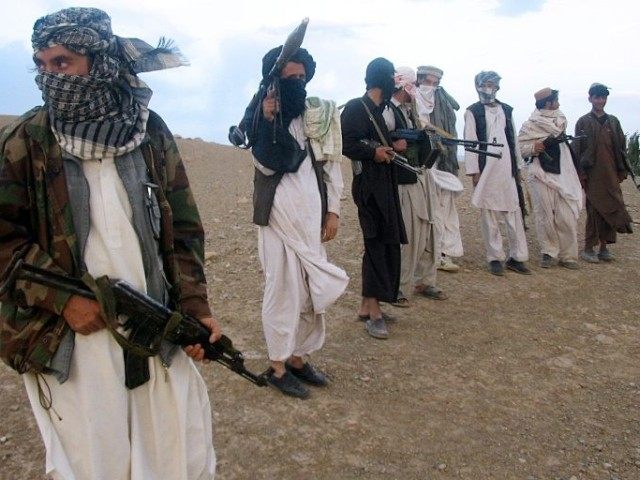Taliban narco-jihadis have vowed to return the strict Islamic rule to Afghanistan they imposed when they ruled the country and treat Afghans of all faiths, backgrounds, and ethnicities the same if ongoing peace negotiations succeed and they rise to power as a legitimate political group.
“If peace comes and the Taliban return, then our return will not be in the same harsh way as it was in 1996,” Taliban spokesman Zabiullah Mujahid told Reuters, alluding to the year they took over in Kabul. “We want to assure Afghan nationals that there will be no threat to anyone from our side.”
Referring to post-peace agreement Afghanistan, the Taliban insists “that as well as the withdrawal of foreign forces, there will be a return to their strict version of Islamic rule, and many Afghans doubt their claims to have softened, even while yearning for an end to the war,” Reuters notes.
Mujahid also claimed the Taliban is not against women’s education or employment but emphasized that the jihadi group wants to maintain cultural and religious codes.
“We are not against women working in government organizations or against their outdoor activities, but we will be against the alien culture clothes worn by women, brought to our country,” Mujahid declared, according to Reuters.
The Taliban briefly ruled Afghanistan before U.S troops removed the group’s regime from power at the end of 2001 for helping al-Qaeda in preparing for the 9/11 attacks. Now, Afghan terrorists, predominantly the Taliban, already control or contest 45 percent of Afghanistan, according to a U.S. watchdog agency.
U.S. President Donald Trump’s administration has come out in full support of Kabul’s offer to the Taliban of a ceasefire and official recognition as a legitimate political power.
America is reportedly considering pulling out nearly half of the 14,000 U.S. troops serving in Afghanistan, but some top military officials claim the Pentagon has yet to receive any orders to start withdrawing from the country.
The Taliban has long advocated for the complete withdrawal of foreign forces as a precondition for negotiating with Kabul directly, which the terrorist group considers a puppet U.S. government not worthy of its time.
“Our opposition is with the presence of foreign troops in Afghanistan. Once they are out and a peace deal is reached, then a nationwide amnesty will be announced,” said Mujahid. “No one, police, army, government employees or anyone, will face revenge behavior from our side.”
Some of those who lived during the Taliban’s regime in Afghanistan have bitter memories of the group’s hardline rules.
“I don’t think their mindset has changed, but they have realized that without respecting human rights, they cannot be accepted by the international community,” Bilal Sediqi, a spokesman for the Afghanistan Independent Human Rights Commission, told Reuters.
Although the U.S has devoted tens of billions on developing the Afghan National Defense and Security Forces (ANDSF), the troops continue to suffer from capabilities lapses. That does not mean they are not willing to fight; they have sustained a record number of casualties that some U.S. military officials say is unsustainable if they assumed the responsibility of their own country.
U.S. President Donald Trumps’ administration has made reconciliation between the Taliban and Kabul the primary goal of its strategy to end the war, raging since October 2001 at the cost of nearly $1 trillion, more than 2,270 deaths, and an excess of 20,400 injuries.
U.S. special envoy Zalmay Khalilzad has been leading President Donald Trump’s intensified peace-seeking efforts, meeting the Taliban several times in recent months.
Both the Taliban and the U.S. are tired of war.
Abdul, a 12-year police veteran currently working in the western province of Farah, told Reuters, “The Taliban are not the old ones. We see changes among them. They are also tired of war.”
Not all Afghans believe the Taliban is changing, accusing the group of just putting on a show to earn people’s trust.
“I think that these statements that the Taliban have changed are only excuses that are being used by the Taliban to gain acceptance,” Malina Hamidi, a teacher at a school in the Chamtal district of Balkh province, reportedly declared. “I am 100 percent confident that once they come back to power, they will be the same Taliban that ruled Afghanistan in the nineties.”
The Taliban generates the vast majority of its funding from opium cultivation and heroin production, both of which are fueling deadly overdose epidemics in the U.S., in and around Afghanistan, and elsewhere. A small amount of Afghan heroin reaches the United States. It is unclear if the Taliban’s opium production is on the table during negotiations to end the more than 17-year-old war.

COMMENTS
Please let us know if you're having issues with commenting.